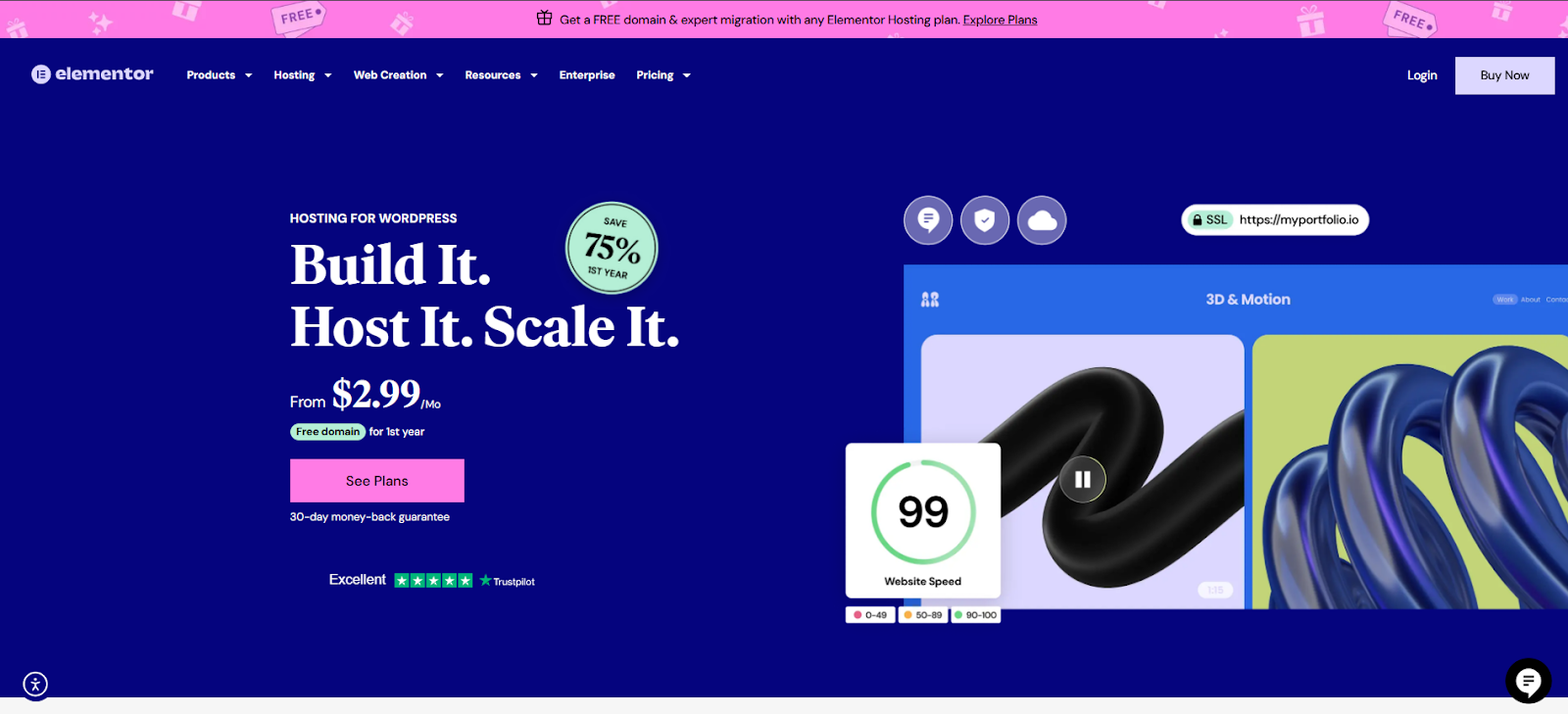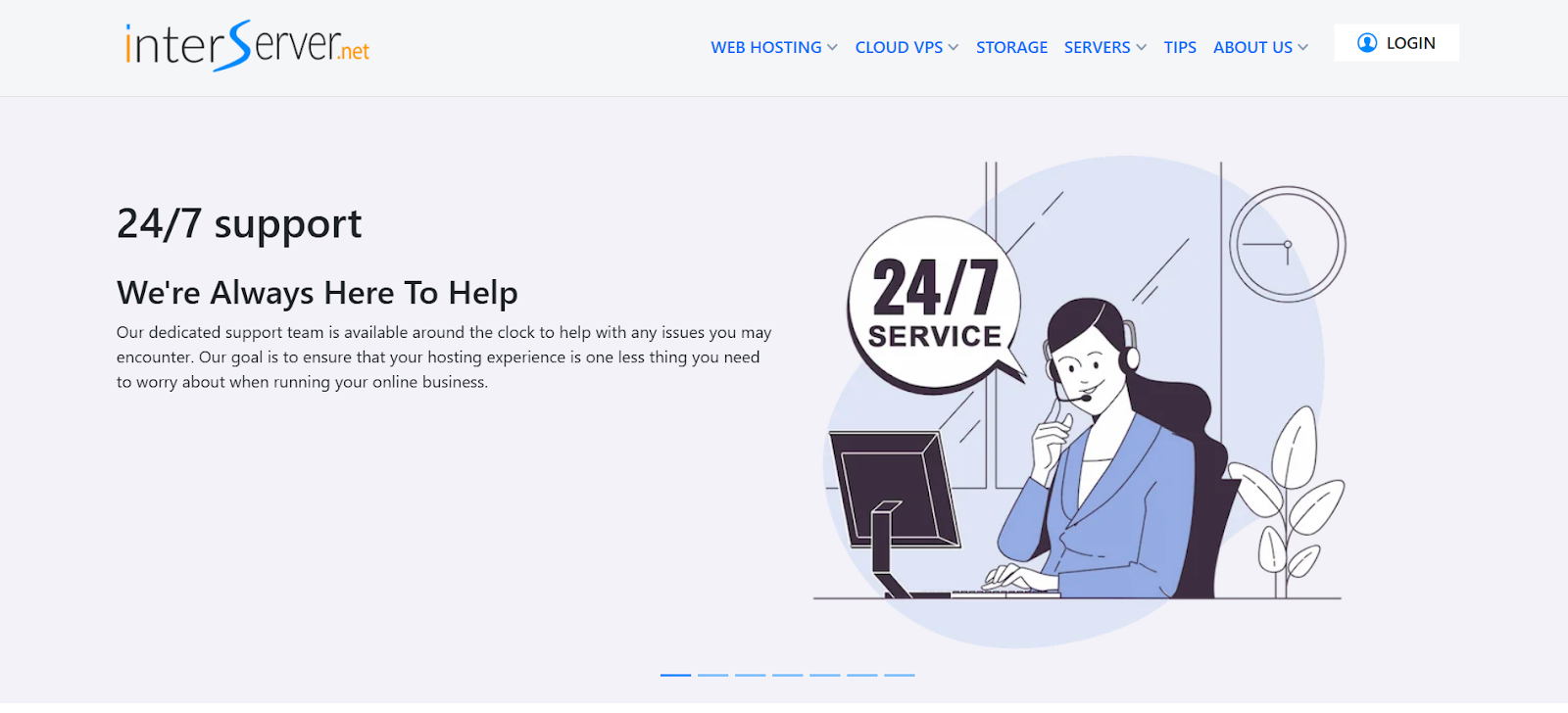Table of Contents
- Elementor Hosting: All-in-One Solution for WordPress Websites
- Bluehost: A Popular Choice for Various Needs
- InterServer: Focusing on Value and Stability
-
- Securing Your Site with SSL and HTTPS
- Setting Up Your Hosting Firewall Rules
- Performing Regular Security Checks
- Backup Strategies & Disaster Recovery
- WAF, DDoS & BotNet Defense Explained
- Adding Multi-Factor Auth Security
- Importance of 24/7 Security Monitoring
- Keeping Software Safe with Auto Updates
- Secure Database & File Transfer Access
- Automatic Security Patch Management
- Using Dev/Stage/Prod Environments Safely
- Benefits of Zero-Handshake TLS Security
- Conclusion
Let’s look at Elementor Hosting, Bluehost, and InterServer side-by-side. We’ll explore their features, benefits, and who they suit best.
Elementor Hosting: All-in-One Solution for WordPress Websites
Elementor Hosting offers a managed WordPress hosting environment. It’s specifically tuned for websites built with the Elementor page builder. This focus means you get an infrastructure designed to make Elementor sites run smoothly.

Features & Benefits:
- Managed WordPress Platform: They handle many technical aspects of WordPress hosting for you, including updates and server management.
- Optimized Performance: Servers are configured for Elementor, aiming for fast load times.
- Cloudflare Enterprise CDN: Content Delivery Network included helps speed up global content delivery.
- Robust Security: Features like free SSL, daily backups, and site monitoring are standard.
- Staging Environment: Test changes safely before pushing them live.
- Elementor Core Included: The free version of the Elementor page builder comes pre-installed. Note: Elementor Hosting includes Elementor Core. You can enhance your site further by purchasing an Elementor Pro license separately.
Key Strengths:
- Seamless integration with the Elementor ecosystem.
- Performance optimizations tailored for Elementor users.
- Managed environment simplifies WordPress technical tasks.
Potential Considerations:
- Primarily designed for users committed to the Elementor builder.
- Elementor Pro features require a separate license purchase.
Who is it Best For? Elementor Hosting is ideal for individuals and businesses building websites with Elementor. If you want a hosting solution designed to work hand-in-glove with your page builder, this is a strong contender. It simplifies setup and management, especially if Elementor is central to your workflow.
Grow Your Sales
- Incredibly Fast Store
- Sales Optimization
- Enterprise-Grade Security
- 24/7 Expert Service

- Incredibly Fast Store
- Sales Optimization
- Enterprise-Grade Security
- 24/7 Expert Service
- Prompt your Code & Add Custom Code, HTML, or CSS with ease
- Generate or edit with AI for Tailored Images
- Use Copilot for predictive stylized container layouts

- Prompt your Code & Add Custom Code, HTML, or CSS with ease
- Generate or edit with AI for Tailored Images
- Use Copilot for predictive stylized container layouts
- Craft or Translate Content at Lightning Speed
Top-Performing Website
- Super-Fast Websites
- Enterprise-Grade Security
- Any Site, Every Business
- 24/7 Expert Service

Top-Performing Website
- Super-Fast Websites
- Enterprise-Grade Security
- Any Site, Every Business
- 24/7 Expert Service
- Drag & Drop Website Builder, No Code Required
- Over 100 Widgets, for Every Purpose
- Professional Design Features for Pixel Perfect Design

- Drag & Drop Website Builder, No Code Required
- Over 100 Widgets, for Every Purpose
- Professional Design Features for Pixel Perfect Design
- Marketing & eCommerce Features to Increase Conversion
- Ensure Reliable Email Delivery for Your Website
- Simple Setup, No SMTP Configuration Needed
- Centralized Email Insights for Better Tracking

- Ensure Reliable Email Delivery for Your Website
- Simple Setup, No SMTP Configuration Needed
- Centralized Email Insights for Better Tracking

- Ensure Reliable Email Delivery for Your Website
- Simple Setup, No SMTP Configuration Needed
- Centralized Email Insights for Better Tracking
Bluehost: A Popular Choice for Various Needs

Bluehost is a well-known name in the hosting industry. They offer a wide range of hosting services, including shared hosting, VPS, and dedicated servers. WordPress.org also officially recommends Bluehost.
Features & Benefits:
- Variety of Plans: Offers hosting options suitable for beginners up to large websites.
- User-Friendly cPanel: Provides a standard, easy-to-navigate control panel.
- WordPress Integration: Often includes one-click WordPress installation and management tools.
- Marketing Credits: Some plans include credits for advertising platforms.
- Scalability: You can usually upgrade your plan as your website grows.
Key Strengths:
- Established company with a long track record.
- Offers a broad spectrum of hosting types.
- Generally considered beginner-friendly.
Potential Considerations:
- Review plan details carefully, especially regarding renewal rates.
- Performance can vary depending on the specific plan chosen.
Who is it Best For? Bluehost serves a wide audience. Due to its ease of use, it’s often chosen by beginners launching their first WordPress site. Businesses needing different types of hosting (shared, VPS) also find suitable options here. It’s a versatile choice for general web hosting needs.
InterServer: Focusing on Value and Stability

InterServer positions itself as a provider offering reliable hosting with straightforward pricing. It emphasizes technical support and security features across its hosting products.
Features & Benefits:
- Standard Web Hosting: Provides shared hosting suitable for many website types.
- VPS & Dedicated Options: Offers more powerful solutions for growing or demanding sites.
- Price Lock Guarantee: Aims to keep your renewal price the same as your initial price for shared hosting.
- InterShield Security: Includes a proprietary security suite to help protect websites.
- Global Content Caching: Helps improve website loading speed.
Key Strengths:
- Focus on long-term price stability for shared hosting.
- Includes several security features as standard.
- Provides knowledgeable technical support.
Potential Considerations:
- The control panel and user interface might feel more traditional.
- It may appeal more to users with some technical understanding.
Who is it Best For? InterServer is a good fit for budget-conscious users seeking stable pricing. Small businesses and individuals who value consistent costs and robust security features often consider InterServer. Its VPS options also attract those needing more control.
Selecting the Best Hosting Plan for You
Choosing the right host involves looking beyond just the names. What factors really matter? Let’s break down key considerations.
Hosting Optimized for WordPress/WooCommerce
Does your website run on WordPress? You could operate an online store with WooCommerce. If so, look for hosting specifically tuned for these platforms. Managed WordPress hosting, like Elementor Hosting, often includes performance tweaks and security settings ideal for WordPress sites. This can lead to faster loading times and a smoother experience.
Define Your Website’s Hosting Needs
What kind of website are you building? A simple blog has different needs than a large e-commerce store or a high-traffic membership site. Consider:
- Expected traffic levels (now and in the future).
- The amount of storage space required for files and images.
- Any special software requirements (e.g., specific PHP versions). Knowing these helps you choose the right resource allocation.
Plan for Future Site Growth
Your website might start small, but what are your goals? Think about scalability. Does the hosting provider make it easy to upgrade your plan? As your traffic and resource needs increase, moving between shared, VPS, or even dedicated servers should be possible. Choose a host that can grow with you.
Manage Your Web Hosting Budget Wisely
Hosting costs vary widely. Shared hosting is usually the most affordable entry point. VPS and dedicated servers cost more but offer better performance and control. Factor in introductory prices versus renewal rates. InterServer’s price lock is attractive here. Also, consider if things like SSL certificates or domain names cost extra.
Why Hosting Reliability & Uptime Matter
Uptime refers to the percentage of time your website is online and accessible. Look for providers guaranteeing high uptime (ideally 99.9% or higher). Frequent downtime drives visitors away and hurts your reputation. Reliable hosting ensures your site is consistently available to your audience.
Faster Speeds with NVMe Server Storage
Storage technology impacts site speed. NVMe (Non-Volatile Memory Express) SSDs are significantly faster than older SATA SSDs or traditional hard drives. Hosts offering NVMe storage, often found in premium or managed plans like Elementor Hosting, can provide a noticeable speed boost for your website.
The Value of 24/7 Expert Hosting Support
What happens when something goes wrong? Access to knowledgeable support, available 24/7, is vital. Check if support is offered via phone, chat, or tickets. Is the support team experienced with your platform (like WordPress)? Good support can save you significant time and stress.
Need for an Easy-to-Use Control Panel
Managing your hosting account involves tasks like setting up email, managing domains, and accessing files. Most hosts offer a control panel like cPanel (used by Bluehost and InterServer) or a custom dashboard (like Elementor Hosting). Choose one you find intuitive and easy to navigate.
Key Factors for Smooth Hosting Migration
Moving your website to a new host can seem daunting. Planning carefully makes the process much smoother. Let’s look at the key steps.
Understanding the Data Transfer Steps
Migrating involves moving your website files and database. Many hosts offer migration tools or services. Some are free, others are paid. Understand what your new host provides. You should back up your files (using FTP) manually and the database (often via phpMyAdmin) from your old host and upload them to the new one.
Handling Your Domain Name During Moves
Your domain name needs to point to the new hosting server. This involves changing the DNS (Domain Name System) settings at your domain registrar. The change can take anywhere from a few hours to 48 hours to fully propagate worldwide, so plan this step carefully to minimize disruption.
Choosing Where to Host Your Emails
Does your current host also manage your email accounts (@[invalid URL removed])? Decide if you want to move your email hosting along with your website. Some hosts include email hosting, while others recommend dedicated email services (like Google Workspace or Microsoft 365). Moving email requires backing up old messages and reconfiguring accounts.
Tips to Prevent Downtime When Migrating
The goal is zero downtime. Here’s how to approach it:
- Upload your site files and database to the new host before changing DNS.
- Test the site thoroughly on the new server using a temporary URL or by modifying your local hosts file.
- Once confirmed working, update your DNS settings.
- Keep the old hosting active for a few days as a backup during DNS propagation.
Using Simple One-Click Migration Tools
Many WordPress hosting providers offer specialized migration plugins or tools. These can automate much of the file and database transfer process. For example, Elementor provides tools to facilitate moving sites built with its builder. Check if your new host offers such a tool—it can simplify things considerably.
Boosting Site Performance on New Hosting
Moving to a new host is a great opportunity to improve your website’s speed. Better performance leads to happier visitors and improved search engine rankings.
Actionable Performance Tuning Tactics
Beyond just the server, optimize your website itself:
- Compress images before uploading.
- Minimize the use of large scripts or plugins.
- Optimize your database regularly.
- Use well-coded themes and plugins.
Using Caching & CDN for Faster Loading
Caching: This stores copies of your website’s files closer to the visitor or in memory. It reduces server load and speeds up delivery. Most managed WordPress hosts (including Elementor Hosting) handle server-side caching. You can also use caching plugins.
CDN (Content Delivery Network): A CDN stores copies of your site’s static assets (images, CSS, JS) on servers around the world. When a visitor accesses your site, content is delivered from the nearest server. Cloudflare (offered by Elementor Hosting and often configurable elsewhere) is a popular CDN choice.
Gains from Cloud Infrastructure Hosting
Hosting built on cloud infrastructure (like Google Cloud or AWS, which Elementor Hosting utilizes) offers benefits like scalability and resilience. Cloud platforms can often handle traffic spikes better than traditional single-server setups. They provide a flexible and powerful foundation for hosting.
Essential Regular Maintenance Routines
Keeping your website fast requires ongoing effort:
- Regularly update WordPress core, themes, and plugins.
- Monitor site speed using tools like Google PageSpeed Insights.
- Clean up old files, drafts, and database tables.
- Continuously look for optimization opportunities.
Essential Web Hosting Security Measures
Website security is non-negotiable. A good host provides foundational security, but you also play a role. Let’s cover critical security practices.
Securing Your Site with SSL and HTTPS
An SSL certificate encrypts data between your website and visitors’ browsers, enabling HTTPS, the secure version of HTTP. Most reputable hosts offer free SSL certificates (e.g., via Let’s Encrypt). Always ensure your site uses HTTPS to protect user data and build trust.
Setting Up Your Hosting Firewall Rules
A Web Application Firewall (WAF) helps filter out malicious traffic before it reaches your website. Some hosts include a WAF (like Elementor Hosting’s Cloudflare integration or InterServer’s InterShield). If you have VPS or dedicated hosting, you might also configure firewall rules at the server level.
Performing Regular Security Checks
Use security plugins or services to scan your website for malware and vulnerabilities. Address any identified issues promptly. Regular scanning helps catch problems early before they cause significant damage.
Backup Strategies & Disaster Recovery
Regular backups are your safety net. Your host should provide automated backups (like Elementor Hosting’s daily backups). However, it’s wise to keep your own off-site backups too. Have a clear plan for restoring your site from a backup if needed (disaster recovery).
WAF, DDoS & BotNet Defense Explained
- WAF: Filters malicious HTTP traffic (as mentioned above).
- DDoS Protection: Defends against Distributed Denial of Service attacks, which try to overwhelm your server with traffic. Many quality hosts include DDoS mitigation.
- BotNet Defense: Blocks traffic from networks of compromised computers (botnets) used for spamming or attacks.
Adding Multi-Factor Auth Security
Enable Multi-Factor Authentication (MFA) or Two-Factor Authentication (2FA) on your hosting account and WordPress admin login. This adds an extra layer of security beyond just a password, making unauthorized access much harder.
Importance of 24/7 Security Monitoring
Your hosting provider should monitor its network and servers for threats 24/7. Services like Elementor Hosting often emphasize this continuous monitoring as part of its managed security approach.
Keeping Software Safe with Auto Updates
Outdated software is a major security risk. Whenever possible, enable automatic updates for WordPress core, themes, and plugins. Managed hosts often handle core WordPress updates automatically.
Secure Database & File Transfer Access
Use strong, unique passwords for database access. When transferring files, use secure protocols like SFTP (Secure File Transfer Protocol) or SSH (Secure Shell) instead of plain FTP, which transmits data unencrypted.
Automatic Security Patch Management
Good hosting providers proactively apply security patches to the server operating system and related software. This helps protect against known vulnerabilities at the server level, something often handled for you in managed environments.
Using Dev/Stage/Prod Environments Safely
Using separate environments for development (Dev), testing (Staging), and the live site (Production) improves security. Elementor Hosting’s staging feature is an example. It allows you to test changes thoroughly in a safe space before deploying them, reducing the risk of introducing vulnerabilities to your live site.
Benefits of Zero-Handshake TLS Security
Modern security protocols like TLS 1.3 include features like Zero Round Trip Time (0-RTT), sometimes called “Zero Handshake.” This can speed up secure connections for returning visitors without compromising security, enhancing both performance and protection. Hosts utilizing advanced infrastructure like Cloudflare often support this.
What’s Next for the Web Hosting Industry
The hosting world is always evolving. Staying aware of trends helps you anticipate future needs and opportunities.
New & Upcoming Hosting Technologies
Expect continued advancements in server hardware (faster CPUs, more RAM), storage (even faster NVMe), and networking. Technologies like containerization (Docker, Kubernetes) are becoming more common, offering flexibility and scalability in deploying applications. Edge computing, bringing processing closer to the user, will also influence hosting.
Eco-Friendly Sustainable Data Centers
Environmental impact is a growing concern. Many hosting providers are investing in green initiatives, such as using renewable energy sources, improving cooling efficiency, and building sustainable data centers. Look for providers committed to reducing their carbon footprint.
AI & Automation in Hosting Management
Artificial Intelligence (AI) and automation are increasingly used in hosting. This includes automated security threat detection, performance optimization suggestions, predictive hardware failure analysis, and more efficient customer support through chatbots. This trend aims to improve reliability and efficiency.
Rise of Green Energy Hosting Servers
Linked to sustainability, there’s a specific push towards servers powered directly by renewable energy sources like solar and wind. Companies are actively seeking ways to make their infrastructure greener, offering eco-conscious hosting options to customers.
Conclusion
Choosing the right web host is fundamental to your online success. We’ve looked at Bluehost’s broad appeal, InterServer’s focus on price stability, and Elementor Hosting’s specialized environment for Elementor users. Consider your specific needs: Are you building with Elementor? Do you prioritize ease of use, budget stability, or scalability?
Think about factors like performance needs (NVMe storage, CDN), security requirements (WAF, backups, monitoring), the importance of expert support, and future growth potential. Migrating to a new host requires planning, but focusing on performance and security afterward is key.
As technology evolves, aspects like cloud infrastructure and green hosting will become even more important. Ultimately, selecting a host that aligns closely with your website’s platform and your workflow, one designed specifically for your primary tools, can significantly streamline management and boost performance. Make your choice thoughtfully.
Looking for fresh content?
By entering your email, you agree to receive Elementor emails, including marketing emails,
and agree to our Terms & Conditions and Privacy Policy.

